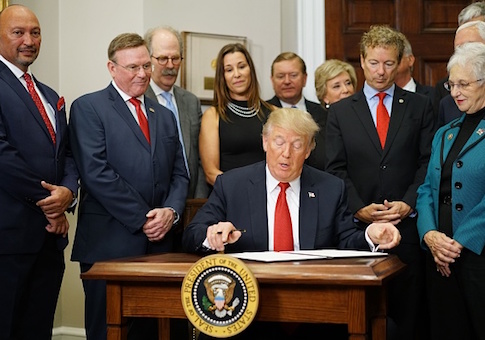President Donald Trump signed an executive order on Thursday tying federal research funding for colleges and universities to their policies governing free speech.
"We are delivering a clear message to the professors and power structures trying to suppress ... young Americans and all Americans from challenging far-left ideology," Trump said at the White House while flanked by free-speech advocates. "People who are confident in their beliefs cannot censor others. They welcome free, fair, and open debate, and that is what we are demanding."
"Under the policy [that] I am announcing today," the president continued, "federal agencies will use their authority under various grant-making programs to ensure that public universities protect [and] cherish ... the First Amendment and [the] First Amendment rights of their students or risk losing millions and millions of federal taxpayer dollars."
Trump's executive order requires the 12 federal agencies that fund higher education research to include free speech protections when determining which schools receive tax-payer grants. To be eligible, public universities and colleges will have to reaffirm their obligation to uphold existing laws concerning "free academic inquiry." Private institutions, on the other hand, will be required to outline and comply with their own "stated institutional policies" regarding free speech. In effect, this means private colleges and universities will have more leeway on restricting free speech than their public counterparts.
Currently, more than 90 percent of colleges and universities have restrictions on free speech and expression, according to the Foundation for Individuals Rights in Education. Such restrictions include limiting free speech to certain zones of the campus, censorship, and codes banning forms of speech allowed in other parts of society. In recent years, the number of legal challenges arising over campus speech restrictions have grown.
It remains unclear how the order will be enforced or which speech restrictions will result in termination of funding.
By focusing on research funding rather than student aid, the Trump administration appears to have found a way to incentivize colleges to respect free speech without hurting students. In 2017, Congress allocated more than $40 billion in research funding to colleges and universities, according to the American Association for the Advancement of Science. Although a fraction of the federal budget, government grants made up more than 50 percent of total higher education research funding.
"That is a lot of money," the president said on Thursday. "We'll not stand by and let public institutions violate students' constitutional rights. If a college or university doesn't allow you to speak, we will not give them money."
Conservatives and First Amendment advocates have spoken favorably of the president's initiative. Charlie Copeland, the president of the Intercollegiate Studies Institute, praised the executive order for "hitting schools exactly where it hurts—their research budgets."
"I think the president is taking the right tack here," Copeland told the Washington Free Beacon. "These universities are getting so much from the taxpayer, and it's the taxpayer's son or daughter who, in turn, is having their constitutional rights restricted."
Copeland said he was "hopeful" the administration's initiative would restore civility, not only on college campuses but in "society at large" as well.
"Eliminating viewpoint diversity has been hugely destructive to the overall ability of Americans to have rational and civil discourse," he said. "That's led to a lot of bigger issues in society and all of it has started and begun building on college campuses."
